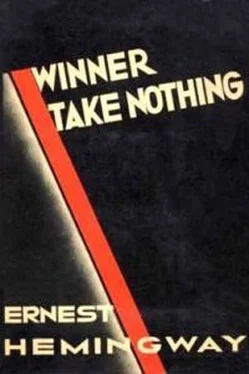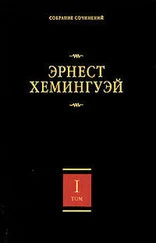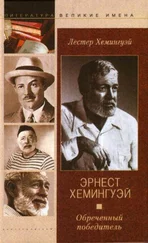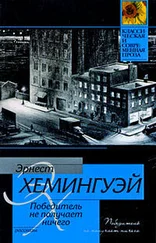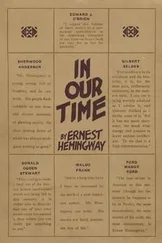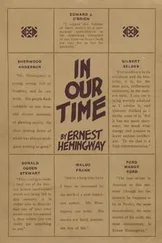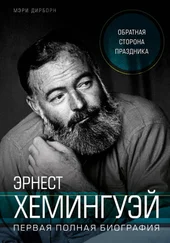We flushed a covey of quail under a high clay bank with overhanging brush and I killed two as they went out of sight over the top of the bank. Some of the covey lit in trees, but most of them scattered into brush piles and it was necessary to jump on the ice–coated mounds of brush several times before they would flush. Coming out while you were poised unsteadily on the icy, springy brush they made difficult shooting and I killed two, missed five, and started back pleased to have found a covey close to the house and happy there were so many left to find on another day.
At the house they said the boy had refused to let any one come into the room.
“You can’t come in,” he said. “You mustn’t get what I have.”
I went up to him and found him in exactly the position I had left him, white–faced, but with the tops of his cheeks flushed by the fever, staring still, as he had stared, at the foot of the bed.
I took his temperature.
“What is it?”
“Something like a hundred,” I said. It was one hundred and two and four tenths.
“It was a hundred and two,” he said.
“Who said so?”
“The doctor.”
“Your temperature is all right,” I said. “It’s nothing to worry about.”
“I don’t worry,” he said, “but I can’t keep from thinking.”
“Don’t think,” I said. “Just take it easy.”
“I’m taking it easy,” he said and looked straight ahead. He was evidently holding tight onto himself about something.
“Take this with water.”
“Do you think it will do any good?”
“Of course it will.”
I sat down and opened the Pirate book and commenced to read, but I could see he was not following, so I stopped.
“About what time do you think I’m going to die?” he asked.
“What?”
“About how long will it be before I die?”
“You aren’t going to die. What’s the matter with you?”
“Oh, yes, I am. I heard him say a hundred and two.”
“People don’t die with a fever of one hundred and two. That’s a silly way to talk.”
“I know they do. At school in France the boys told me you can’t live with forty–four degrees. I’ve got a hundred and two.”
He had been waiting to die all day, ever since nine o’clock in the morning.
“You poor Schatz,” I said. “Poor old Schatz. It’s like miles and kilometers. You aren’t going to die. That’s a different thermometer. On that thermometer thirty–seven is normal. On this kind it’s ninety–eight.”
“Are you sure?”
“Absolutely,” I said. “It’s like miles and kilometers. You know, like how many kilometers we make when we do seventy miles in the car?”
“Oh,” he said.
But his gaze at the foot of the bed relaxed slowly. The hold over himself relaxed too, finally, and the next day it was very slack and he cried very easily at little things that were of no importance.
A Natural History of the Dead [1] This story was published in a rather technical book called Death in the Afternoon, which sold, or rather was offered for sale, at $3.50. It is reprinted here in case any one not caring to spend that appreciable sum for a rather technical book should care to read it.
It has always seemed to me that the war has been omitted as a field for the observations of the naturalist. We have charming and sound accounts of the flora and fauna of Patagonia by the late W. H. Hudson, the Reverend Gilbert White has written most interestingly of the Hoopoe on its occasional and not at all common visits to Selborne, and Bishop Stanley has given us a valuable, although popular, Familiar History of Birds . Can we not hope to furnish the reader with a few rational and interesting facts about the dead? I hope so.
When that persevering traveller, Mungo Park, was at one period of his course fainting in the vast wilderness of an African desert, naked and alone, considering his days as numbered and nothing appearing to remain for him to do but to lie down and die, a small moss–flower of extraordinary beauty caught his eye. “Though the whole plant,” says he, “was no larger than one of my fingers, I could not contemplate the delicate conformation of its roots, leaves and capsules without admiration. Can that Being who planted, watered and brought to perfection, in this obscure part of the world, a thing which appears of so small importance, look with unconcern upon the situation and suffering of creatures formed after his own image? Surely not. Reflections like these would not allow me to despair; I started up and, disregarding both hunger and fatigue, travelled forward, assured that relief was at hand; and I was not disappointed.”
With a disposition to wonder and adore in like manner, as Bishop Stanley says, can any branch of Natural History be studied without increasing that faith, love and hope which we also, every one of us, need in our journey through the wilderness of life? Let us therefore see what inspiration we may derive from the dead.
In war the dead are usually the male of the human species although this does not hold true with animals, and I have frequently seen dead mares among the horses. An interesting aspect of war, too, is that it is only there that the naturalist has an opportunity to observe the dead of mules. In twenty years of observation in civil life I had never seen a dead mule and had begun to entertain doubts as to whether these animals were really mortal. On rare occasions I had seen what I took to be dead mules, but on close approach these always proved to be living creatures who seemed to be dead through their quality of complete repose. But in war these animals succumb in much the same manner as the more common and less hardy horse.
Most of those mules that I saw dead were along mountain roads or lying at the foot of steep declivities whence they had been pushed to rid the road of their encumbrance. They seemed a fitting enough sight in the mountains where one was accustomed to their presence and looked less incongruous there than they did later, at Smyrna, where the Greeks broke the legs of all their baggage animals and pushed them off the quay into the shallow water to drown. The numbers of broken–legged mules and horses drowning in the shallow water called for a Goya to depict them. Although, speaking literally, one can hardly say that they called for a Goya since there has only been one Goya, long dead, and it is extremely doubtful if these animals, were they able to call, would call for pictorial representation of their plight but, more likely, would, if they were articulate, call for some one to alleviate their condition.
Regarding the sex of the dead it is a fact that one becomes so accustomed to the sight of all the dead being men that the sight of a dead woman is quite shocking. I first saw inversion of the usual sex of the dead after the explosion of a munition factory which had been situated in the countryside near Milan, Italy. We drove to the scene of the disaster in trucks along poplar–shaded roads, bordered with ditches containing much minute animal life, which I could not clearly observe because of the great clouds of dust raised by the trucks. Arriving where the munition plant had been, some of us were put to patrolling about those large stocks of munitions which for some reason had not exploded, while others were put at extinguishing a fire which had gotten into the grass of an adjacent field; which task being concluded, we were ordered to search the immediate vicinity and surrounding fields for bodies. We found and carried to an improvised mortuary a good number of these and, I must admit, frankly, the shock it was to find that these dead were women rather than men. In those days women had not yet commenced to wear their hair cut short, as they did later for several years in Europe and America, and the most disturbing thing, perhaps because it was the most unaccustomed, was the presence and, even more disturbing, the occasional absence of this long hair. I remember that after we had searched quite thoroughly for the complete dead we collected fragments. Many of these were detached from a heavy, barbed–wire fence which had surrounded the position of the factory and from the still existent portions of which we picked many of these detached bits which illustrated only too well the tremendous energy of high explosive. Many fragments we found a considerable distance away in the fields, they being carried farther by their own weight.
Читать дальше
Конец ознакомительного отрывка
Купить книгу
